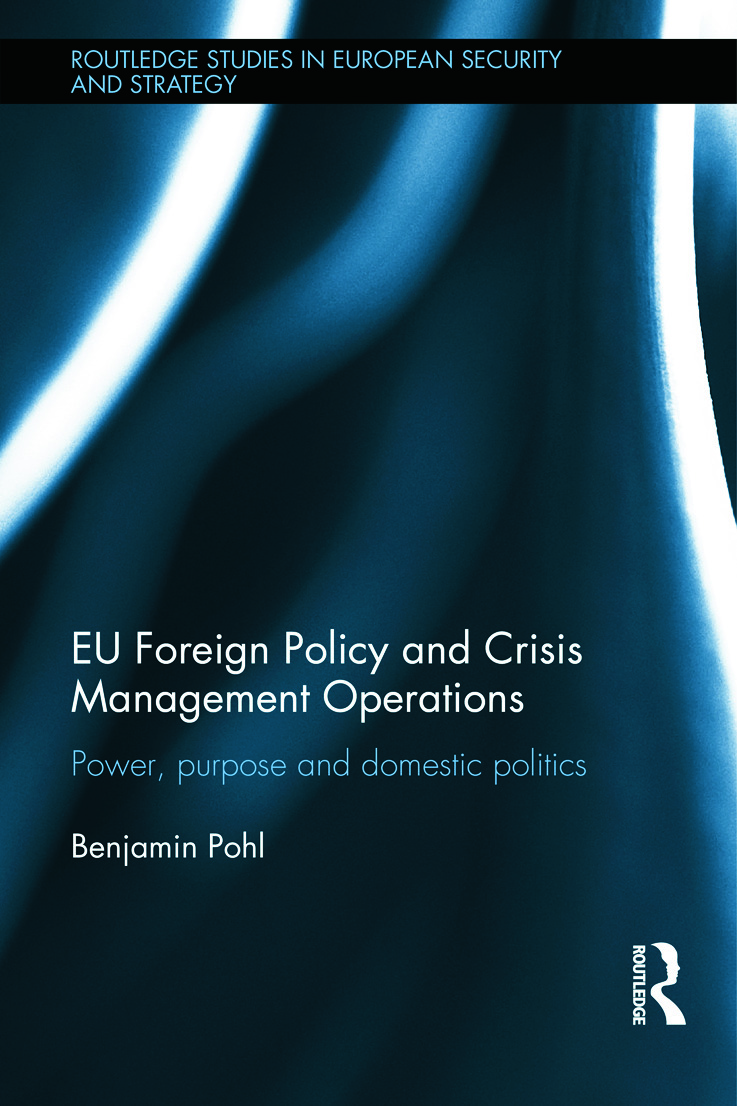EU Foreign Policy and Crisis Management Operations
Power, purpose and domestic politics
By Benjamin Pohl
Routledge – 2014 – 232 pages
Description:
This bookexplores the drivers of the EU’s recent forays into peace- and state-building operations.
Since the Union’s European (now Common) Security and Defence Policy (ESDP/CSDP) became operational in 2003, the EU has conducted more than 20 civilian and military operations that broadly served to either deter aggression in host countries, and/or to build or strengthen the rule of law. This sudden burst of EU activity in the realm of external security is interesting from both a scholarly and a policy perspective. On one hand, institutionalised cooperation in the field of foreign, security and defence policy challenges the mainstream in IR theory which holds that in such sovereignty-sensitive areas cooperation would necessarily be limited. On the other hand, the sheer quantity of operations suggests that the ESDP may represent a potentially significant feature of global governance.
In order to understand the drivers behind CSDP, EU Foreign Policy and Crisis Management Operations analyses the policy output in this area, including the operations conducted in the CSDP framework. Up until now, many studies inferred the logic behind CSDP from express intentions, institutional developments and (the potential of) pooled capabilities. By mining the rich data that CSDP operations represent in terms of the motives and ambitions of EU governments for the CSDP, this book advances our understanding of the framework at large.
This book will be of much interest to students of European Security, EU policy, peacebuilding, statebuilding, and IR.
Content:
1. Introduction 2. CSDP Operations and International Relations Theories 3. Studying CSDP Operations 4. Bosnia 5. Kosovo 6. Afghanistan 7. Chad 8. CSDP Operations and Cross-National Preferences 9. Conclusion
Reviews:
Since the Union’s European (now Common) Security and Defence Policy (ESDP/CSDP) became operational in 2003, the EU has conducted more than 20 civilian and military operations that broadly served to either deter aggression in host countries, and/or to build or strengthen the rule of law. This sudden burst of EU activity in the realm of external security is interesting from both a scholarly and a policy perspective. On one hand, institutionalised cooperation in the field of foreign, security and defence policy challenges the mainstream in IR theory which holds that in such sovereignty-sensitive areas cooperation would necessarily be limited. On the other hand, the sheer quantity of operations suggests that the ESDP may represent a potentially significant feature of global governance.
In order to understand the drivers behind CSDP, EU Foreign Policy and Crisis Management Operations analyses the policy output in this area, including the operations conducted in the CSDP framework. Up until now, many studies inferred the logic behind CSDP from express intentions, institutional developments and (the potential of) pooled capabilities. By mining the rich data that CSDP operations represent in terms of the motives and ambitions of EU governments for the CSDP, this book advances our understanding of the framework at large.
This book will be of much interest to students of European Security, EU policy, peacebuilding, statebuilding, and IR.
Content:
1. Introduction 2. CSDP Operations and International Relations Theories 3. Studying CSDP Operations 4. Bosnia 5. Kosovo 6. Afghanistan 7. Chad 8. CSDP Operations and Cross-National Preferences 9. Conclusion
Reviews:
‘Rejecting the realist, normative and integrationist explanations for CSDP, Pohl identifies the primary driver behind the EU's security and defence policy as domestic politics. This is an important, challenging and original work which scholars will discuss for years to come.’ Jolyon Howorth, Yale University
‘EU Foreign Policy and Crisis Management Operations provides the best diplomatic history to date of the political debates and intergovernmental bargaining processes behind the main crisis management operations conducted by the Union. Extremely well written, it uses this account of what the EU has done to compare and assess the explanatory power of existing theoretical approaches. This original angle results in a comprehensive account of the drivers behind - and a balanced and persuasive interpretation of - the Common Security and Defence Policy as we know it. Anyone interested in EU foreign policy, or indeed contemporary foreign and security policies, should definitely read it.’ Antonio Missiroli, Director of the European Union Institute for Security Studies
Source from: http://www.routledge.com/books/details/9780415712668/
‘EU Foreign Policy and Crisis Management Operations provides the best diplomatic history to date of the political debates and intergovernmental bargaining processes behind the main crisis management operations conducted by the Union. Extremely well written, it uses this account of what the EU has done to compare and assess the explanatory power of existing theoretical approaches. This original angle results in a comprehensive account of the drivers behind - and a balanced and persuasive interpretation of - the Common Security and Defence Policy as we know it. Anyone interested in EU foreign policy, or indeed contemporary foreign and security policies, should definitely read it.’ Antonio Missiroli, Director of the European Union Institute for Security Studies
Source from: http://www.routledge.com/books/details/9780415712668/









0 Comment :
Post a Comment
Thanks for your comment!